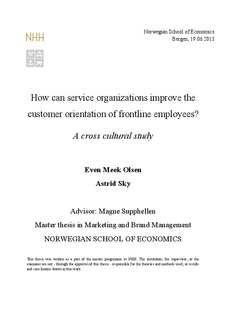| dc.description.abstract | Frontline employees, the employees with customer contact, are the face of service
organizations and play a critical role in determining customer satisfaction. Service quality is
greatly improved when these employees are customer oriented. Customer orientation refers to
an individual’s commitment to delivering great customer service. While some research exists,
the antecedents to customer orientation are insufficiently studied. Answering a call for new
insights into this important topic, this master thesis explores how service organizations can
improve the customer orientation of frontline employees.
We collected surveys from 645 frontline employees in a large, international
telecommunication company. Since these employees represent two subsidiaries in
Scandinavia and one in South Asia, we are able to investigate the generalizability of our
findings across cultures.
We find that a key to developing customer orientation is a strong team service climate, where
team members support each other and encourage good customer service. Another important
antecedent is self-efficacy; frontline employees who are confident in their abilities to serve
customers are more customer oriented. Contrary to our expectations, customer oriented
supervisors have no direct effect on their subordinates. These three findings are consistent
across cultures, while other effects vary. In Scandinavia, the impact of having a strong team
service climate is even greater when their supervisor is customer oriented, highlighting the
importance of developing a service culture. Also, empowerment is only positively related to
customer orientation in South Asia. Since South Asian frontline employees in our sample feel
less empowered than their Scandinavian peers, there may be potential in granting them greater
flexibility to handle customer requests. Further, organizational identification has a positive
effect in Scandinavia, implying a caution against outsourcing customer care departments.
These, and other findings, are discussed. We also provide managerial implications, suggesting
how mangers can increase the customer orientation of their frontline employees. | no_NO |
